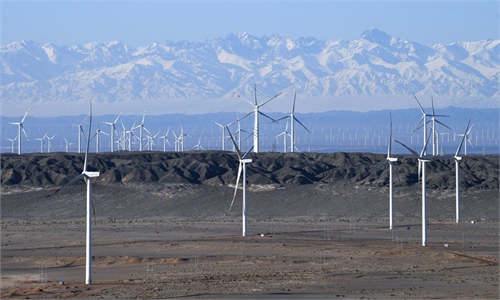
View of piles of coal on a quay in Rizhao, East China's Shandong Province Photo: cnsphoto
China's daily coal output has reached 11.93 million tons, the highest level in recent years, and increasing coal supplies have laid a good foundation to ensure energy supply security and residential heating during the winter, the nation's top economic planner said on Monday, as many parts of the country were hit by a severe coal wave over the weekend.
Analysts said that officials' ability to quickly stabilize coal supplies as well as prices underscored the country's capabilities in dealing with emergencies and its determination to put livelihood at front and center.
On Sunday, as a severe cold wave hit northern China with heavy snow, many areas, including Beijing and some cities in East China's Shandong Province and North China's Hebei Province, enjoyed early heating, which usually starts from November 15.
From November 1-5, the average daily dispatch of coal reached 11.66 million tons, an increase of more than 1.2 million tons from the end of September, as coal mines have been gradually put into operation, the National Development and Reform Commission (NDRC) said on Monday.
The thermal coal supply has also continued to increase, and the rebound of coal inventories at power plants has been accelerated. Since early November, the average daily supply of coal at power plants has hit 7.74 million tons and coal inventories have reached 1.6 million tons, according to the NDRC.
On November 6, the stock of coal reserves across the country's power plants exceeded 117 million tons, an increase of about 40 million tons compared with the end of September.
Meanwhile, the NDRC again urged enterprises to sign medium- and long-term contracts for coal and electricity for the fourth quarter in 2021.
In September, China experienced power shortages in some areas partly caused by tight coal supplies. In order to tackle the power crunch, China has taken various measures, including increasing domestic coal outputs and imports.
In October, China's coal imports stood at 26.943 million tons, an increase of 96.3 percent year-on-year, according to customs data.
Increases in coal production and supplies across the country have sent prices down, the NDRC said, adding that prices are expected to decline with the further release of coal production.
An energy analyst surnamed Guan told the Global Times on Monday that coal prices will continue to fall to levels nearly 50 percent lower than October's prices, as China's coal market has been stabilized and seen a significant improvement.
Guan said that the current coal supply will ensure a warm winter for Chinese residents, highlighting the country's ability respond to harsh weather conditions and its determination to put people's livelihoods at the forefront.
Global Times



